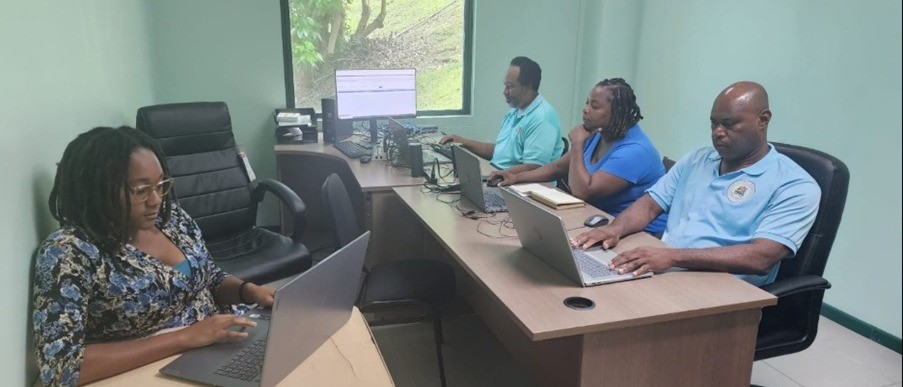FAO supports Grenada in advancing digitalisation of land governance
Training on the Land Bank Information System boosts transparency and streamlines land processes.

©Courtesy Ministry of Agriculture - Grenada.
The Ministry of Agriculture and Lands, Forestry and Marine Resources (MOALFC), with support from the Food and Agriculture Organization of the United Nations (FAO), has successfully completed training on the Land Bank Information System (LBIS)—a web-based platform developed with FAO’s technical assistance to manage state-owned agricultural lands under Grenada’s Land Bank. The system is designed to improve transparency, efficiency and access to land information, while enabling scalable digital transformation through the transition from fragmented, paper-based processes to centralised, data-driven platforms.
Held virtually on 26–27 and 30 June 2025, the training brought together ten national officers from the MOALFC Head Office in St George’s. Facilitated by Alexander Solovov, FAO technical consultant and developer of the LBIS platform, the sessions provided hands-on guidance for IT administrators on system setup and maintenance, and for land management staff on using the platform’s front-end functions.
The LBIS is a component of Grenada’s Pilot Agricultural Land Bank Project, launched in 2017 to bring idle or underutilised arable land into productive use and improve access to land—particularly for women and youth. The project also aims to strengthen land administration capacity and boost agricultural productivity, contributing to Grenada’s national development priorities and supporting CARICOM’s regional goal of reducing the food import bill by 25 percent by 2025.
“The Grenada team is the most experienced and well-prepared, having already received training in the past. They are just one small step away from fully using the system,” said Alexander Solovov, FAO consultant. “Several excellent ideas emerged during the sessions that could further strengthen LBIS, particularly in monitoring and inspecting leased parcels.”
Joseph Noel, Project Coordinator and UNCCD National Focal Point at the Ministry, emphasised:
“The LBIS training marks another important step toward fully operationalising Grenada’s Agricultural Land Bank. As the only country in the region with prior experience using the system, this training allowed us to deepen our capacity and move closer to full deployment. The LBIS will streamline lease management, support timely reporting and enhance transparency and accountability in public land administration.”
The LBIS is expected to deliver long-term benefits, including:
greater efficiency and transparency in land lease management
improved tracking and accountability of leased lands
easier access to agricultural land for eligible farmers and producers
stronger data for agricultural planning and policy development
With its strong institutional foundation and pilot sites at Grand Bacolet Estate (St Andrew) and Diamond Estate (St Mark), Grenada is well positioned to lead the region in modernising agricultural land governance and advancing digital solutions for sustainable land use.
About FAO
The Food and Agriculture Organization of the United Nations (FAO) works to eliminate hunger, improve food security, and promote sustainable agricultural and natural resource management. The FAO Subregional Office for the Caribbean (FAO SLC), based at the UN House in Barbados, partners with governments and communities to strengthen resilience and drive agri-food transformation across the region.
See FAO’s policy brief “Land Banks in the Caribbean: A Tool for Equitable Land Access and Food Security,” (2025) co-authored by Stephanie Elder-Alexander and Marta Ruiz Salvago, which provides evidence and lessons from pilot experiences across the region.
